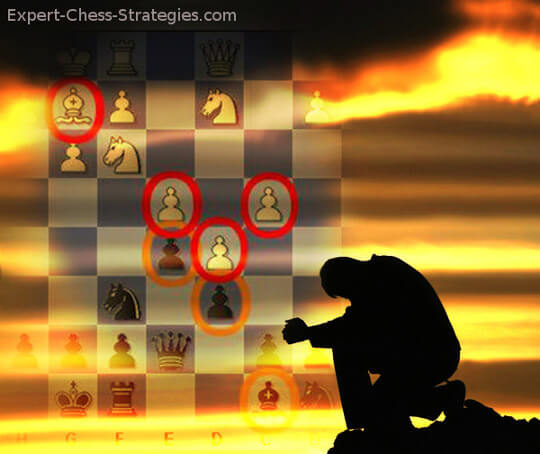by Kartik (India)
My question is:
if I open with, for example, the Kings Gambit and follow the moves that are usually done, but what if the other person is a beginner and doesn’t respond as a good player should do, then proceeding with same moves in the opening is irrelevant..
How could I take advantage of any bad move or even know that it is a bad move..same goes for traps like Fried Liver Attack.
What if the other person does something else..how could I know it is bad move and take advantage of it?
————–Admin—-
Hi Kartik,
this is a good question.
I think every beginner at chess has been thinking about this problem at some point.
How can I know if it is a bad move if the opponent varies from chess theory and plays his own move?
The answer is simple: Everything that deviates from “the truth” is most likely bad or inferior.
What is the Truth in Chess?
The truth is what is recommended by chess theory.
Chess Grandmasters follow recommendations of chess theory and don’t play their own moves in the openings and seldom deviate only if a move is proven to be playable by strong chess computers. However, grandmasters have a deep understanding of “chess truth”!
If a player plays something which is not theory this move is likely to be inferior, not necessarily outright bad, but probable not good either and sometimes very bad and sometimes such a move loses material and the game immediately. Or the player drifts into a bad position because of such a move.

Study Chess Principles
Get a book about your opening and study it. Especially the remarks and comments of the author are VERY important to UNDERSTAND chess.
You don’t get better just by memorizing opening lines using a chess software. Forget this!
Get a book and read it and study the various PLANS and STRATEGIC IDEAS of your opening. (Chess Principles)
After that you know when your opponent has played a different move that is recommended according to theory, this particular move must be dubious in some way.
Maybe you get a strong attack running after his move, or he loses a pawn, or he runs into a fork, or he gets an isolated pawn, or he must trade his good bishop for your bad knight, or he must trade his good bishop for your bad bishop, or his kingside gets weak or, or, or …..
Do you know what I mean?
It is like in mathematics. All that deviates from the truth must be inferior in some ways.
Example: 1 + 1 = 2
if someone says 1 + 1 = 3 then there nust be something wrong. Either this person doesn’t know mathematics or some other reason, but you know for sure that there is something wrong …
This is the same at chess. You follow proven chess principles.
A chess principle represents some aspect of “the truth”.
For example:
Don’t develop your opponent!
Don’t trade your bishop for knight in open positions.
Don’t move pawns in front of your king unless your king is save.
Castle early!
Control the center!
If your opponent violates a principle then this must be bad for his position in some way.
Study chess principles by reading chess books. Only this makes you a better player. But it takes years…
Just playing chess only does not help much, because you just play, but don’t study.
This means you play the same nonsense countless times for many years to come, because you don’t know any chess principles.
When you have studied books about “chess strategy” and “positional chess” then, after some years, you will finally understand “the truth” in chess or part of it.
And if someone deviates from the truth after this you will know it and you will feel it. If that happens you study his move and you will understand what’s wrong with it.
As a beginner at chess you have not sufficient chess knowledge to judge correctly if a move is good or not.
Don’t waste time playing chess only, but study it deeply with books or DVD’s.
And study solid chess openings like the Queens Gambit, the Nimzo-Indian and the Queens Indian and stay away from dubious Opening Attacks and Opening Gambits like the Kings Gambit, which is not a recommended opening for White and not played by grandmasters at top level chess events, because Black equalizes quickly and you got nothing as White.
There are better openings than dubious gambit play, just play what grandmasters play.
I hope this helps…
 Sick of Losing at Chess? Get Chess Courses from a Grandmaster directly! HUGE Discount! Click here!
Sick of Losing at Chess? Get Chess Courses from a Grandmaster directly! HUGE Discount! Click here!Get Chess Course -Beginners Package- from a Grandmaster! Huge Discount!